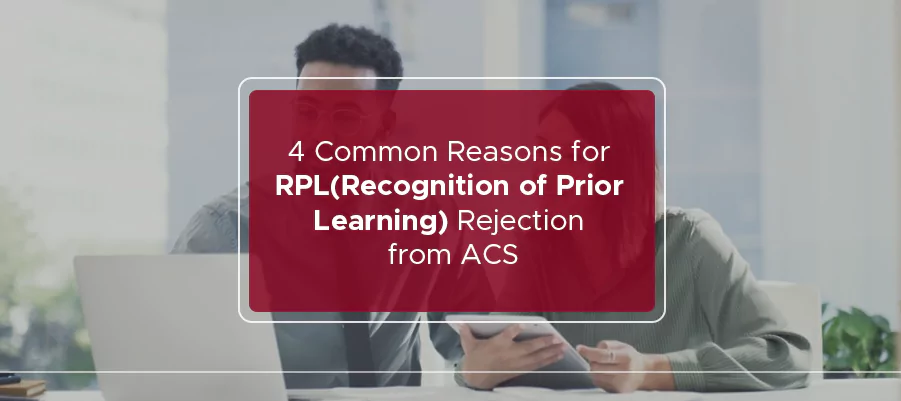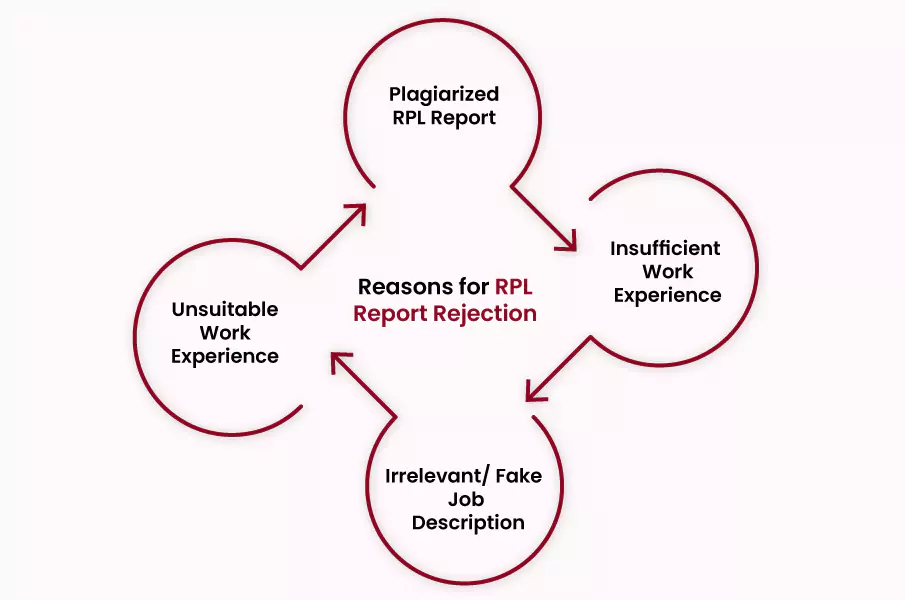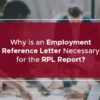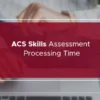
4 Common Reasons for RPL Rejection from ACS
Wondering why RPL rejection is common? Get to know the main reasons for RPL rejection from ACS despite being careful while writing your RPL. Firstly, let’s see what RPL is. Recognition of Prior Learning (RPL) is a valuable pathway for skilled professionals seeking to migrate to Australia and contribute their expertise to the country’s thriving industries.
The Australian Computer Society (ACS), a recognized authority in Information and Communication Technology (ICT), offers the RPL skills assessment process to evaluate the qualifications and work experience of individuals who do not possess formal ICT qualifications.
RPL assesses a person’s relevant prior learning to determine the credit results of a specific requirement (including formal, informal, and non-formal education). Candidates must meet particular abilities and eligibility requirements. to apply for an ACS skill assessment.
While the RPL assessment provides a significant opportunity for professionals to showcase their skills and knowledge, it is crucial to understand the common reasons for RPL rejection from the ACS.
Familiarizing yourself with these reasons can assist you in avoiding common mistakes or blunders and improve your chances of a successful skills assessment outcome. In this blog, we will dive into the four common reasons for RPL rejection and provide insights on addressing and overcoming them effectively.
RPL rejection is standard, as the ACS rejects thousands of RPL reports each year for various reasons. When analyzing Recognition Of Prior Learning reports, the Australian Computer Society considers multiple factors and recommendations: being hundred percent unique and original, having relevant work experience and specialized certifications, having an ANZSCO Code for a specified occupation, and so on are some elements.
Top 4 Common Reasons for RPL Rejection
If your RPL report has any errors, it will get rejected by ACS. So, when writing and submitting professional projects, use prudence.
Let’s get this conversation started. We’re sorry that the Australian Computer Society rejected your RPL report. Don’t worry; we’ll explain why ACS rejected your RPL Report.
Last year, our Recognition Of Prior Learning Report Expert looked into the causes behind numerous RPL rejections or disapproval. According to its findings, the ACS does RPL rejection to those who need to follow steps or be made aware of ACS regulations/rules.
For example, the Australian Computer Society rejected those who should have taken appropriate projects when writing their RPL report. Still, those who hired Recognition Of Prior Learning report writers were successful. You should still provide the authors with your RPL report.
To accomplish this, you’ll need to extensively study the ACS RPL Report’s standards, rules, and regulations. Below are the top four common reasons for RPL Rejection:

1. Plagiarized RPL Report
Plagiarism is a severe offense and can lead to the outright rejection of an RPL application. The ACS places great importance on the originality and authenticity of the RPL reports submitted by applicants. Plagiarism includes copying content from other sources without proper attribution or submitting RPL reports previously used by someone else.
All data, documents, and content available on the internet or other websites are solely for informational purposes. Plagiarism is prohibited. Every material you write should be unique, and the sample documents should only get used as examples or guides.
Do not be a slacker when creating the report; one of a kind and unique. Many users use our website to get Sample reports, copy the complete sample, and email ACS. Those RPL reports are the only examples we’ve supplied to assist you in creating your Recognition Of Prior Learning Project report. ACS is strict; they use advanced plagiarism detection tools and will reject your report if they find any.
Developing an RPL report that is entirely your work is crucial to avoid the risk of plagiarism. Each claim and statement in the report should get based on your experience, skills, and knowledge.
Referring to external sources for information and research is acceptable, but the language and presentation should be unique to your understanding and expression. Additionally, it gets recommended to use proper referencing techniques to acknowledge any external sources used.
To produce a plagiarism-free Recognition Of Prior Learning Report, focus on research, use our reference example, a grammar checker, and plagiarism detection tools like Grammarly or Turnitin. You can be confident that the RPL report will be 100% original, distinctive, and plagiarism-free if you engage our expert writers and editors. We offer writers for a wide range of professions.
Learn More: Get help in preparing the RPL report for the ACS skills assessment. 🙌🏻 👏🏻
2. Unsuitable Work Experience
Another common reason for RPL rejection is when the work experience presented by the applicant needs to align with the ACS requirements or the specific ICT Key Areas of Knowledge. The ACS expects applicants to demonstrate a substantial level of ICT experience relevant to the occupation they seek a skills assessment.
- Concurrent Employment
It can only accept one employment episode when one employment period is done simultaneously with another.
- Not Related to the Nominated ANZSCO Closely
The responsibilities get judged as needing to be more closely connected to the nominated occupation based on the information in the paperwork.
- Not Assessable due to Insufficient Documentation
The documentation submitted either fulfills the Skills Assessment Guidelines’ standards or needs to be sufficient to meet our assessment criteria.
- Not Assessable due to Insufficient Detail
To avoid rejection due to unsuitable work experience, it is essential to carefully review the ACS guidelines and ensure that the work experience you present is relevant to the occupation you are applying for.
It should demonstrate your ICT skills, responsibilities, and achievements. If you need more specific experience in certain areas, you can focus on showcasing transferable skills or acquiring additional certifications to strengthen your application.
Learn More: ACS Processing Time for RPL Report ⏱⌛️
3. Irrelevant/ Fake Job Description
Providing an irrelevant or fake job description is another reason for RPL rejection. The ACS assessors rely on the information in the job description to evaluate the relevance and depth of an applicant’s ICT experience. If the job description accurately reflects the ICT-related responsibilities and tasks performed, it can raise doubts about the authenticity of the experience presented.
To avoid rejection due to an irrelevant or fake job description, providing a clear and detailed description of the ICT-related responsibilities and tasks you have undertaken in your previous roles is essential. Avoid exaggerations or misrepresentations that may raise suspicions. It is advisable to include specific examples and outcomes to demonstrate the practical application of your ICT skills and knowledge.
Your job description is the primary source of information regarding your ICT expertise and abilities. As a consequence, select job descriptions that are both accurate and timely. The job description should include only your relevant work experience and skills earned while working as an ICT professional.
Sixty-five percent of the tasks in your Recognition Of Prior Learning report and experience letter must get completed. Your RPL will only be allowed if the position you applied for matches the job description. As a result, candidates should show that they possess specific skills relevant to the job.
Above all, pick your project carefully. Select assignments that allow you to demonstrate your knowledge and abilities as outlined in any ANZSCO codes you wish to apply for. Most applicants needed help determining which ANZSCO codes were acceptable for their employees, and the ACS RPL Report failed.
Instead of becoming humiliated, read more about the ANZSCO code and its equivalent job title. Don’t hesitate to contact our specialist if you need clarification about your occupation or ANZSCO code. They’ll get back to you in under a minute.
4. Insufficient Work Experience
Insufficient work experience is another common reason for RPL rejection. The ACS requires applicants to have a significant amount of relevant work experience to meet the skills assessment requirements. If an applicant fails to provide substantial evidence of their work experience, it can result in rejection.
Many candidates are perplexed by this issue. The ACS includes numerous criteria for skill level requirements, and there is a distinction between job skill evaluation before and after the qualification. To fulfill the eligibility criteria for skilled migration, you must first have a specified number of years of work experience.
Work experience only gets deemed skilled employment and qualifies for the skilled migration point if it meets the appropriateness requirements. Your RPL will be refused or graded as “Inappropriate due to lack of experience” if your overall work experience does not exceed the qualifying conditions.
That is why, before applying for a skill assessment, it is critical to understand the ACS skill evaluation procedure and point system. It is preferable to get adequate work experience before using it for an ACS competency evaluation.
Here are some examples of job experience:
- The applicant’s name, working hours, applicant position, job duties, and other identifying information are all included on the employment letterhead.
- If you operate a business relevant to the nominated occupation list and work as an ICT expert, you must provide a registered account’s business registration information and official statements.
If requirements are not up to the mark, the application will get denied as “wrong report format or lack of expertise.” To avoid rejection due to insufficient work experience, it is essential to carefully assess the ACS guidelines and understand the minimum requirements for the skills assessment.
If you have some intervals or breaks in your work experience, consider gaining additional relevant experience through internships, volunteer work, or part-time roles. Comprehensive documentation, such as reference letters, project reports, and certifications, is also recommended to support your work experience claims.
Learn More: Pathways for Migration Skills Assessment ✏️✏️
ACS RPL Guidelines
Remembering that the Recognition Of Prior Learning report’s policies is revised regularly is vital. As a result, you must identify these new laws and regulations and correctly apply them to your Recognition Of Prior Learning report to obtain a 100% success rate. Before the implementation, we’ll review the ACS RPL Report and its importance.
Recognition Of Prior Learning is a skill and knowledge assessment for persons with ICT or third-category ICT credentials. Before relocating to Australia, the Australian Computer Society (ACS) requires a person to earn skills and expertise in other fields.
As a result, both technical and non-technical applications get examined by ACS. The Australian Skills Migration Service requires ICT professionals to submit their qualifications, work experience, and knowledge (ACS). As a result, ICT workers who do not hold a secondary ICT qualification must fill out an ACS RPL Report Form.
You can engage a professional RPL writing service provider, such as CDRReportWriters, if you don’t want RPL rejection. We can help you construct a thorough RPL Report and review your RPL report.
It would be best to be more concerned about the concerns listed and not disregard these tiny things since they might get used as an RPL rejection reason. So, be cautious when drafting your Recognition Of Prior Learning Report and sending it to ACS.
An Employment Reference Letter is also necessary for RPL Report. We can help you in preparing an employment reference letter, and you can also get ACS RPL samples from us. Our RPL professionals are here to help and answer any questions.
Learn More: Skilled Employer Sponsored Regional Visa (Subclass 494) 📖📖
Conclusion
In conclusion, while the RPL pathway offers a valuable opportunity for professionals without formal ICT qualifications, it is crucial to know the common reasons for RPL rejection from the ACS.
Applicants can enhance their chances of a successful skills assessment outcome by addressing the issues of insufficient evidence, aligning with the ICT Key Areas of Knowledge, providing detailed project descriptions, and demonstrating adherence to the ACS Code of Ethics.
Reviewing the ACS guidelines is recommended, as seeking professional guidance, investing time preparing a solid and comprehensive RPL application, and navigating the RPL process effectively.
By carefully collecting and organizing your evidence, aligning with the ACS requirements, and showcasing your ICT skills and expertise, you can increase your chances of a positive assessment outcome and successfully pursue your professional migration goals.





